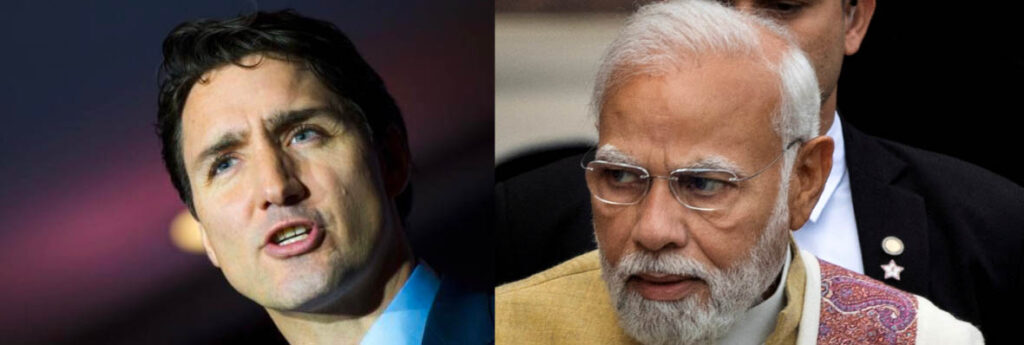India’s visa processing centre in Canada suspended services Thursday as a rift widened between the countries after Canadian Prime Minister Justin Trudeau told Parliament on Monday that there were “credible allegations” of Indian involvement in the assassination of Sikh independence activist Hardeep Singh Nijjar, who was gunned down in June outside the temple he led in suburban Vancouver.
Canada also expelled an Indian diplomat, to which India retaliated by expelling a Canadian diplomat, calling the allegations being investigated in Canada absurd and an attempt to shift attention from the presence of Nijjar and other wanted suspects in Canada.
The BLS Indian Visa Application Center in Canada that processes visa requests for India posted a sign that said, “Important notice from Indian Mission: Due to operational reasons, with effect from 21 Sept. Indian visa services have been suspended till further notice.” It gave no further details.
Meanwhile members of the Indo-Canadian community are reeling as the travel plans for those set on visiting the country are caught in the crossfire of the diplomatic blowup.
Indian External Affairs Ministry spokesman Arindam Bagchi confirmed a temporary suspension of all visa services for Canadians, including e-visas and visas issued in third countries.
“Security threats being faced by our high commission and consulates in Canada have disrupted their normal functioning. Accordingly, they are temporarily unable to process visa applications. We will be reviewing the situation on a regular basis,” Bagchi told reporters.
He called for a reduction in Canadian diplomats in India, saying they outnumbered India’s staffing in Canada.
“We have informed the Canadian government that there should be parity in strength and rank equivalence in our mutual diplomatic presence,” Bagchi said.
The Canadian High Commission in New Delhi said Thursday that all of its consulates in India are open and continue to serve clients. It said some of its diplomats had received threats on social media, prompting it to assess its “staff complement in India.”
It added that Canada expects India to provide security for its diplomats and consular officers working there.
Some business people are also worried about fallout from the diplomatic row. Travellers and the travel sector at large have been rattled by the sudden ramp-up in tensions between Canada and India.
Shaker Ahmed Choudhury, who manages a travel agency in Montreal, says nearly a third of his clientele are Indo-Canadian.
“We’ve got a lot of Indian customers, especially who are travelling to Amritsar, Punjab.
“It definitely is a setback for us because it’s a large population and a big market,” he said of the visa processing suspension.
However, Urvi Chawla, who works at Sahib Travel Agency in Brampton, Ont. said, “People are a little scared.” The agency has been inundated with questions about visas and flight availability. However, no signs of a dip in demand have emerged.
“People are asking if anything’s going wrong or if flights will be cancelled,” she said. “We don’t have any answers, because we don’t know… but the flights are going.”
Other companies face a potential pinch too. While flights to India make up a fraction of Canada’s travel market – less than 40 of Air Canada’s 4,000-plus weekly flights are between this country and the subcontinent – the growing number of immigrants and international students still make it a major spot on the map of some businesses, from agricultural exporters to airlines.
In 2021, 80,000 Canadian tourists visited India, making them the fourth largest group, according to India’s Bureau of Immigration.
There were 212 one-way flights between India and Canada in August, according to aviation data firm Cirium, about 14% more than a year earlier. The increase comes after a bilateral deal in November that lifted the cap on plane trips from 35% for each country to an unlimited number.
Air Canada the only airline besides Air India to offer direct flights between the two countries – operates 19 trips a week to New Delhi and Mumbai, mainly from Toronto but Montreal as well.
As the travel industry recovers from the COVID-19 pandemic, University of Manitoba transport institute director Barry Prentice says the dispute would likely hurt operators only if it spirals out of control, since the pull of education and loved ones remains far stronger than the rhetoric of a diplomatic rift.
We aren’t at that point, he said, adding “It’s obviously just political duelling going on. It’s an effort by the government of India to try to obfuscate the situation where they’ve been charged as having hit crews going out and dealing with people they don’t like.”
India remains a small market for the tourism sector in Canada, and accounts for about one to three percent of leisure travellers who arrive in BC each year. Most of those are here to study or see loved ones – the country is home to about 1.86 million Indo-Canadians, according to the 2021 census – on top of a small cohort of business people.

